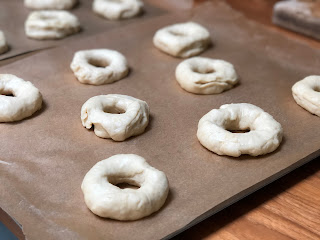I should start off by saying that I don't have a sourdough starter, the on trend accessory of any quaran-baker's kitchen. More accurately, I don't have an *active* sourdough starter, because I do have one buried in the back of the freezer that may or may not wake up when I thaw it. Thankfully, we have had plenty of flour (25 pound bags from Costco FTW), but the prospect of caring for yet another living organism right now seems overwhelming.
Enter rapid-rise yeast from stage left, plus a propitious picture shared by A of family bagel-making from stage right. When combined with a pandemic-induced dearth of bagels in the bakery section of the grocery store, my mission became clear: homemade bagels were in our future. (We do have delicious/expensive bagels relatively nearby, but the line can be ridiculous.) I asked A for the recipe in June, and then I was off.
All I needed was...
malted milk powder? I never knew that was the secret ingredient! But it turns out it's necessary both in the dough and in the water bath. I was just relieved that I didn't need to use lye; previously, I had been scared off from bagel-making because I thought this toxic compound
was necessary. Time has also allowed me to come around to the idea of two steps in cooking; for example,
these French fries, which require parboiling prior to a stint in the oven, are delicious. You can see that the sugary/malted-milky water bath resembles a steaming witches' brew.
After a quick dip on each side in the water bath and a brush of egg white, the bagels are ready for their twenty minutes in the oven. Today I made plain, cinnamon raisin, everything, and furikake (special thanks to ER and TR for the suggestion).
Some were devoured as a late lunch, some were delivered to our neighbors, some were sliced and frozen.
One side note before you start your very own bagel-making: I'm aware that it's been a long time since I've posted (nigh on 8 years, though in some ways it seems like no time has passed). Here is a brief summary of changes: A was born and is now 6; E is almost "double digits" and a voracious reader; we moved to Seattle; I have a
real job; the kids started school recently, one in person and one remote.
During several moves and a home
renovation, I have continued to cook and bake, but it's been hard to figure out how a blog fits in. J and S suggested a resurrection a few months ago, so here we are. As I get perilously close to the
answer of the meaning of life and as the pandemic drags on, hopefully the blog will provide a welcome distraction for me and my small cadre of readers alike.
I should note that J's special request was not for bagels; stay tuned for future editions, one of which may include jook!
Bagels
Makes approximately 16
Total time: 3 hours to overnight (1 hour active)
For the bagels:
2 1/4 t. (1 packet) active dry yeast, rapid-rise, or instant yeast
2 c. lukewarm water
2 T. sugar
1 T. salt
5 3/4 c. all-purpose flour
1/2 c. malted milk powder
For the water bath:
2 quarts water
2 T. malted milk powder
1 T. sugar
Toppings:
2 egg whites, beaten with a fork
if desired: everything mixture (see below), furikake, etc.
In a large bowl, mix together all of the ingredients for the bagels (no need to allow the yeast to bloom with the water for 5 minutes as is called for in many recipes). Knead until smooth, approximately 5 minutes/300 turns if by hand. In general, the dough should be slightly wet and shiny rather than floury. Shape into a ball. If making the night before, wrap in two layers of plastic wrap and place in the fridge overnight; if making the same day, place in a lightly oiled bowl, cover with plastic, and allow to rise until doubled (1-2 hours).
When ready to bake, gently deflate the dough, and transfer to work surface (without extra flour on hand). Prepare the water bath by adding all the ingredients into a wide, but deep, pot; then bring to a boil. Preheat the oven to 425 (I use convect).
Divide the dough into 16 pieces, preferably with a pastry scraper. Shape them individually into balls. Next, poke a hole through the middle with your index finger, and twirl around your thumb to make a bagel shape. Because the dough is elastic, and because it will rise, the hole should be at least 1 to 1.5 inches in diameter (i.e., bigger than you think it needs to be). Place the bagels on a parchment-lined baking sheet as they are made.
Once all the bagels are shaped, lower the water bath to a simmer and gently transfer 4 bagels into the water. Simmer on each side for 30 seconds, then use a strainer to return them to the baking sheet. Brush with egg white mixture, plus toppings as desired.
Bake for 20 minutes, or until they are a deep golden brown. Then enjoy!
Variation: To make cinnamon raisin bagels, spread the dough out after kneading into an 8" by 8" rectangle. Sprinkle 1 t. cinnamon and 1/2 c. raisins onto rectangle. Then roll up like a jelly roll, and knead a few turns to make sure ingredients are incorporated. Proceed with recipe.
Everything topping
3 T. white sesame seeds
3 T. black sesame seeds
1 T. poppy seeds
2 T. dehydrated onion
1 T. flaky sea salt
Mix all ingredients, and store in a tightly sealed jar.









